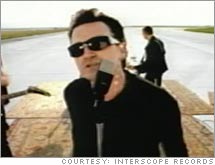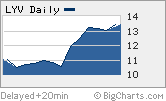Live Nation: A hot ticket?
Shares of concert promotion firm Live Nation are on a tear but investors should look for the exits.
NEW YORK (CNNMoney.com) � The concert business, like the rest of the music industry, has fallen on tough times during the past few years. Sure, total revenue from the top 100 tours in North America did increase last year. According to figures from concert tracking firm Pollstar, revenue in North America was $3.1 billion in 2005, up from $2.8 billion in 2004.
But the main reason behind the increase was the fact that tickets for the most popular shows continued to get more expensive. The average ticket price for the top 100 tours last year was $57, up from $52.39 a year ago. Actual attendance declined by 4 percent, with the top tours selling 36.1 million tickets in 2005, compared to 37.6 million lighter-wielding concert-goers ("Freebird!") a year earlier. That's the second year in a row that attendance was down. So faced with this backdrop, you'd think that shares of Live Nation, the concert promotion company recently spun-off by radio giant Clear Channel Communications (Research), would be as desirable as a ticket to see Vanilla Ice. But that hasn't been the case. Since Live Nation (Research) began trading as a separate company on December 21, the stock has soared nearly 25 percent. What gives? Cheap ticket at first glance...
Phil Remek, a media analyst with Guzman & Co., said that some investors may have been tempted to buy the stock because there has been so much negative buzz about the concert industry. So at Live Nation's opening price of $11 a share, the risk may have seemed minimal. "Potentially, investors were looking for a bargain since expectations were low," he said. In addition, Live Nation made itself more intriguing to value investors when it announced on the day of the spin-off that it was launching a plan to buy back as much as $150 million in stock by the end of 2006. Buybacks are viewed favorably by investors since they lower share count and, therefore, boost earnings per share. "It appears that Clear Channel has created value with the spin-off," said Laura Martin, an analyst with Soleil-Media Metrics. But analysts warn that just because Live Nation has made some shareholder-friendly moves, it doesn't mean that now is the time to rush headlong into the stock like a disaffected suburban youth jumping into a mosh pit at a heavy metal concert. (Not that I have any experience with this.) In fact, it wouldn't be a surprise to see professional investors look to dump the stock since the price has risen so quickly to a level that would even make a ticket scalper blush. "I don't think there's been a change in sentiment about the live entertainment business. It hasn't been a great business and I don't expect the fundamentals to shift," said David Bank, an analyst with RBC Capital Markets. To that end, Live Nation's revenues dipped 3.4 percent during the first nine months of 2005. What's more, the business is not incredibly profitable. Live Nation's net profit margins were just 2.1 percent in 2003 and margins dipped below 1 percent in 2004 and through the first nine months of 2005. Remek argues that the one thing Live Nation has in its favor for the short term is that the concert industry still seems to enjoy strong pricing power. Fans of popular acts like The Rolling Stones, the Eagles, Paul McCartney and Elton John all paid an average of more than $100 for a ticket last year, according to Pollstar. The average price of a ticket to see U2 was just under the century mark. And since demand for the priciest tours has remained robust, that has helped to soften the impact of the overall decline in attendance. "When will there be a consumer backlash to high ticket prices? People predict that consumers will walk away but it hasn't happened," said Remek. ...but now the stock price has a big markup
Still, how much longer can that remain the case? Remek said that longer term, a big concern for Live Nation is that there appears to be few younger artists that can command top ticket prices. "How many more Rolling Stones tours can there be?" Remek said. "Consumers will pay up for quality content but there is a limited amount of real talent out there. That is a real issue for all aspects of the music industry." Bank argues that younger artists will need to tour more in the future in order to pay the bills, since album and song prices are coming under pressure in the digital age. That could bolster Live Nation's business. On the other hand, Live Nation has to pay hefty fees to performers (a big reason why the company isn't very profitable). And with the entire music industry in flux, Bank said musicians will probably demand even higher fees, which could further eat into profits. "As people continue to get more and more recorded content for free, one can assume that artists will attempt to make more money by performing live," Bank said. "And the artists are pretty powerful." To be sure, Live Nation is protected somewhat from downside in the music industry since it also makes money from producing touring versions of Broadway shows and motor sports events like monster truck shows and supercross races. And the theater business had a solid 2005, with revenues up 5 percent through the first nine months of the year. But concerts account for nearly 80 percent of the company's total sales. So as long as the music industry remains mired in a funk, it's hard to imagine how Live Nation's stock can give an encore performance of its recent surge. Analysts quoted in this story do not own shares of the companies mentioned and their firms have no investment banking relationships with the companies. ----------------------------------------------------------------- The man who sold his concert business to Clear Channel is now investing in Elvis. Click here for more.
For a look at more media and entertainment stocks, click here. |
| ||||||||||||||||||||||||||||||||||||||||||||||||





